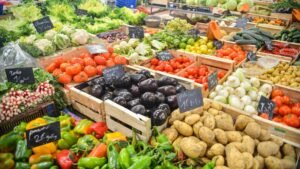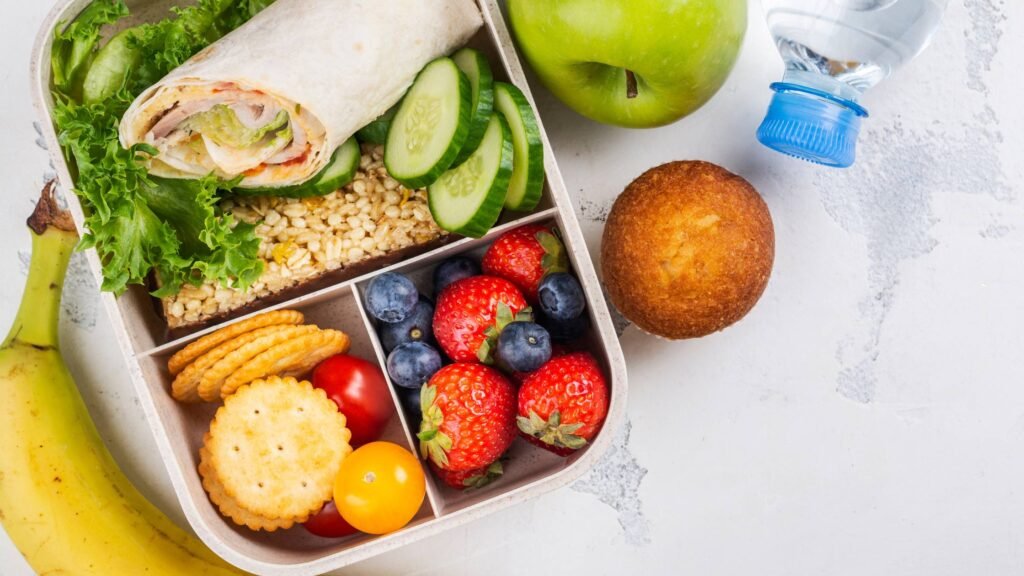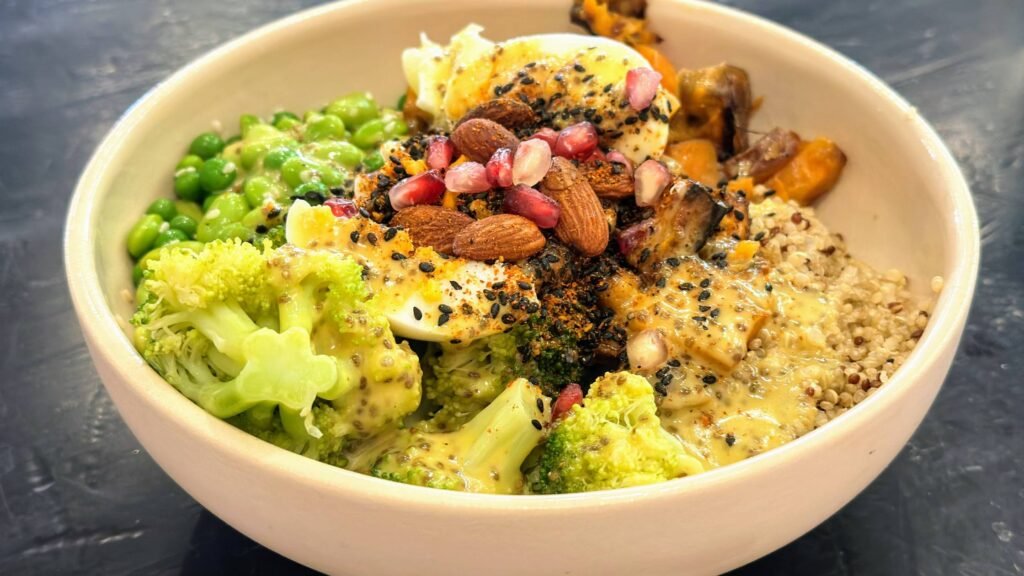When it comes to maintaining a healthy diet, the first step is often the hardest: getting your grocery list together.
But, don’t worry – you don’t have to overcomplicate things. There are some simple, nutrient-dense foods that should be staples in every healthy diet, and I’m here to share exactly which ones should make it onto your grocery list.
These foods are not only easy to find, but they’ll also support your body’s needs and keep you feeling great.
10 Foods to Add to Your Grocery List for a Healthy Diet

1. Leafy Greens: Spinach, Kale, and Swiss Chard
You can’t go wrong with greens. They’re packed with fiber, vitamins, and minerals, making them a must-have for anyone looking to stay healthy.
Think of leafy greens as your body’s best friend when it comes to supporting your immune system and digestion.
A lot of people skip the greens aisle in the grocery store, but once you realize how versatile they are, you’ll be stocking up every week.
You can toss them in salads, blend them into smoothies, or sauté them with a little olive oil and garlic for a simple side dish. If you’re new to kale, it can feel a little tough, but massaging it with a little lemon juice or olive oil before eating helps soften it up.
And if you want to sneak some greens into your day, smoothies are your best bet!
Pro tip: If you’re really pressed for time, go for pre-washed and chopped greens. They may cost a bit more, but the convenience is worth it.
2. Berries: Blueberries, Strawberries, and Raspberries
Berries are small but mighty. They’re packed with antioxidants, vitamin C, and fiber, which is exactly what you need to fight off inflammation and support your gut health.
Plus, they’re a sweet treat that won’t spike your blood sugar like other sugary snacks.
Frozen or fresh, berries should be a constant presence in your kitchen. Add them to oatmeal, yogurt, or even salads for a refreshing burst of flavor.
If you’re trying to satisfy a sugar craving, grab a handful of mixed berries instead of reaching for processed sweets. Your taste buds—and your body—will thank you.
Pro tip: Don’t just eat them as a snack! Blend them into your morning smoothie or add them to your cereal for an extra boost.
3. Sweet Potatoes
Sweet potatoes are one of those foods that are both comforting and incredibly nutritious. They’re high in beta-carotene (which converts into vitamin A in your body) and have a good amount of fiber, which helps with digestion and keeping you full.
Roast them, mash them, or make fries – sweet potatoes are versatile enough to go with nearly every meal.
Many people go for regular potatoes, but sweet potatoes take it to the next level when it comes to nutritional value.
Plus, they have a naturally sweet flavor, so you can skip the added sugars and still enjoy something that feels like a treat.
Pro tip: If you’re short on time, microwave them. Just poke a few holes in the skin, pop them in, and cook for 5–10 minutes, depending on the size. Instant, healthy satisfaction!
4. Salmon
Salmon is often touted as the king of fish, and for good reason. It’s packed with omega-3 fatty acids, which are essential for heart health, brain function, and reducing inflammation.
If you’re not a fan of fish, don’t worry—you can find other sources of omega-3s, but salmon is probably the tastiest and easiest to prepare.
One of the easiest ways to cook salmon is to season it with a little salt, pepper, and olive oil, then pop it in the oven for about 12-15 minutes.
It’s delicious on its own, but you can also serve it with a simple salad or some steamed veggies for a well-rounded meal.
Pro tip: Buy frozen salmon if fresh isn’t available or too pricey. It’s just as nutritious, and you can keep it stocked for those days when you don’t feel like making a trip to the store.
5. Avocados
Avocados are more than just a trendy addition to your toast. They’re full of healthy fats that support brain health and help your body absorb vitamins. Not only that, but they have fiber and potassium, making them great for overall health.
Slice them on top of salads, mash them up for guacamole, or just eat them with a sprinkle of salt for a quick snack.
Many people are hesitant about eating avocados because they’re high in fat, but it’s the good kind of fat that your body needs.
They’re calorie-dense, so you don’t need much to feel satisfied.
Pro tip: If you buy avocados in bulk and they ripen too fast, pop them in the fridge. They’ll stay fresh longer.
6. Greek Yogurt
Greek yogurt is a great source of protein and probiotics, which support gut health and boost your immune system.
Many people don’t realize that a serving of Greek yogurt can have as much protein as a small chicken breast, making it a great alternative for vegetarians or anyone looking to up their protein intake.
Top your yogurt with berries, honey, or granola for a quick and filling snack, or use it as a base for smoothies. Some even use it in cooking as a healthy substitute for sour cream or mayonnaise.
Pro tip: Choose plain, unsweetened Greek yogurt to avoid added sugars. You can always sweeten it naturally with a drizzle of honey or maple syrup.
7. Nuts and Seeds
Almonds, walnuts, chia seeds, flaxseeds—these tiny foods pack a punch when it comes to health benefits. They’re high in healthy fats, protein, and fiber, making them perfect for curbing hunger and supporting heart health.
A handful of nuts or seeds can be the perfect on-the-go snack, and they’re great to add to smoothies, oatmeal, or yogurt for a little crunch.
The key is moderation, though—nuts are calorie-dense, so it’s easy to overeat them without realizing it.
Pro tip: Keep a small bag of mixed nuts in your purse or gym bag for a quick snack when you need something satisfying.
8. Legumes: Lentils, Chickpeas, and Beans
Legumes are often overlooked, but they’re an essential part of any healthy diet. Packed with protein, fiber, and essential vitamins, they’re perfect for keeping you full and energized throughout the day.
Plus, they’re super affordable, which makes them a budget-friendly option for anyone trying to eat healthily.
You can throw them in salads, use them as a base for veggie burgers, or even blend them into soups and stews.
Don’t be afraid to try different kinds—lentils, black beans, chickpeas—each variety has its own unique flavor and texture, so you can mix things up!
Pro tip: If you’re using canned beans, make sure to rinse them to cut down on sodium.
9. Quinoa
Quinoa is a gluten-free grain that is an excellent source of complete protein, meaning it contains all nine essential amino acids. It’s also packed with fiber, B vitamins, and minerals like iron and magnesium.
Whether you’re vegetarian, vegan, or just trying to add more plant-based meals to your diet, quinoa is a great choice.
You can use quinoa as a base for salads, bowls, or even as a side dish to replace rice or pasta. It cooks up quickly, and its light, fluffy texture makes it super versatile.
Pro tip: Cook extra quinoa and store it in the fridge for a few days. You can easily add it to salads or stir-fries for a quick meal.
10. Olive Oil
Olive oil is the staple of the Mediterranean diet, and it’s no surprise why. Full of monounsaturated fats, olive oil supports heart health and provides anti-inflammatory benefits.
Use it in cooking, drizzle it on salads, or even add it to your smoothies for a little extra boost of healthy fat. Just be mindful of the quantity, as it’s calorie-dense.
But when used properly, olive oil can take a simple dish from bland to bursting with flavor.
Pro tip: Look for extra virgin olive oil, as it’s the least processed and offers the most health benefits.
Final Thoughts
The key to a healthy diet isn’t about restriction—it’s about making good, nutrient-dense choices. By adding these ten foods to your grocery list, you’re setting yourself up for a balanced, healthy lifestyle.
The beauty of these foods is that they’re easy to find, simple to prepare, and packed with nutrients that support overall wellness.
Whether you’re trying to boost your energy, improve your digestion, or maintain a healthy weight, these foods can help you achieve your goals.
So, next time you’re heading to the store, grab some of these wholesome ingredients and get ready to create meals that nourish your body and taste amazing.
It’s all about making small, consistent changes—these foods will keep you feeling your best without making you feel deprived.
Happy shopping, and here’s to a healthier you!
How can I incorporate these healthy foods into my busy schedule?
It’s easier than you think! You can prep some of these foods in advance to save time during the week.
For example, cook a batch of quinoa or sweet potatoes over the weekend and store them in the fridge for quick meals. Pre-wash your greens and pack them into containers for easy salad prep.
Keep nuts and seeds on hand for quick snacks. By setting yourself up with these staples ahead of time, you can easily toss them into your meals without much effort.
Are these foods expensive to buy?
Not necessarily! While some items, like fresh salmon or organic avocados, might cost a little more, many of these foods are quite affordable.
Sweet potatoes, legumes (like beans and lentils), and quinoa are budget-friendly staples that can stretch across multiple meals.
Buying frozen fruits and veggies, as well as bulk nuts or seeds, can also help save money. Plus, eating more nutrient-dense foods might actually help you save on health care costs in the long run!
Can I still enjoy treats while eating healthy?
Absolutely! Eating healthy doesn’t mean you have to give up your favorite indulgences. The key is moderation.
Instead of completely cutting out sweets, try healthier alternatives like dark chocolate (which is rich in antioxidants) or a fruit-based dessert.
You can also mix in small amounts of your favorite treats while focusing on nutrient-dense foods most of the time. Balance is the key to a sustainable, healthy lifestyle!

